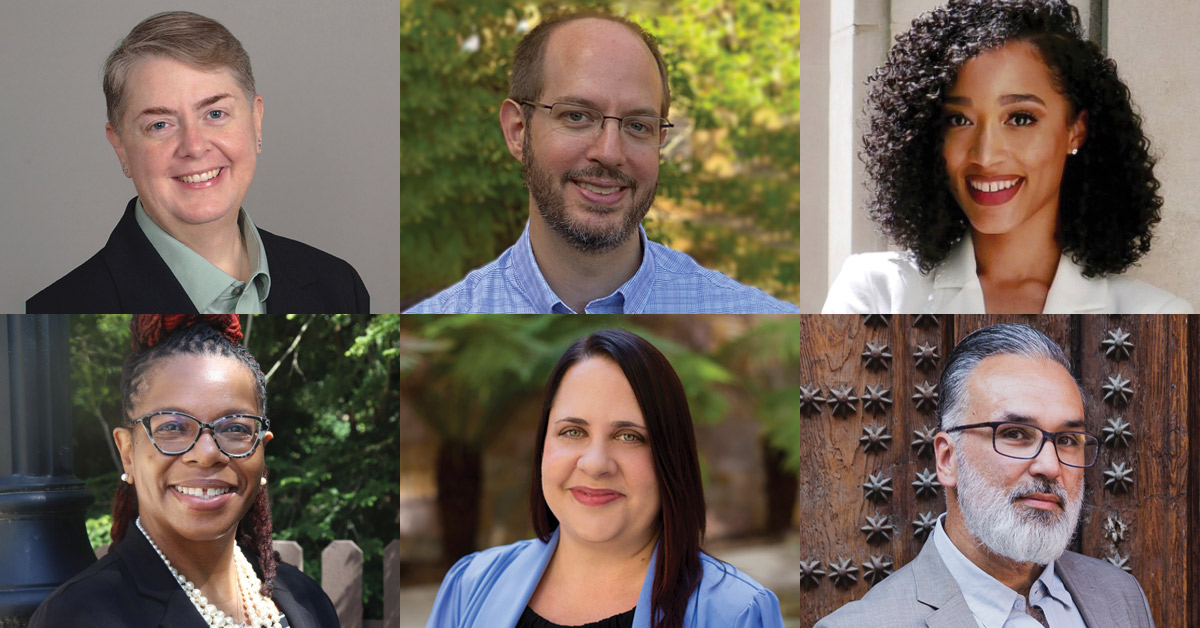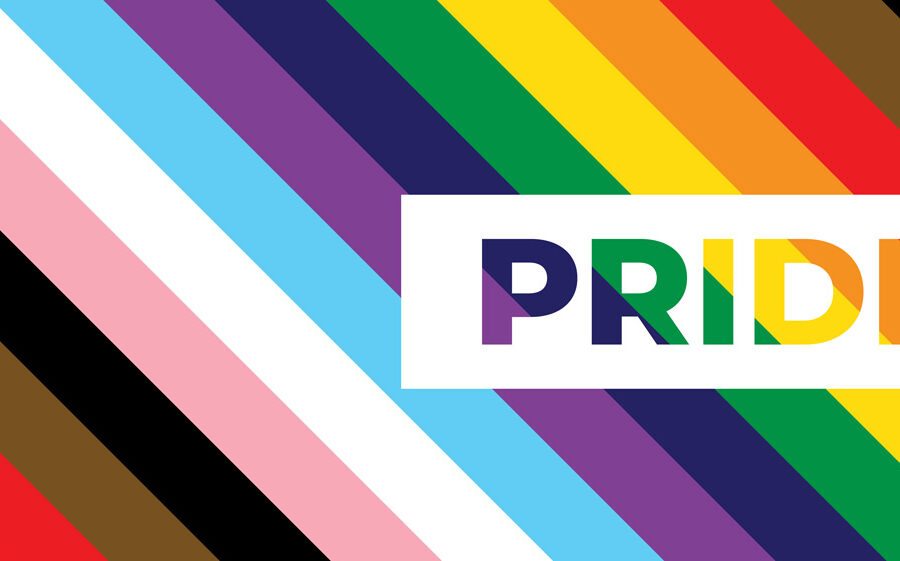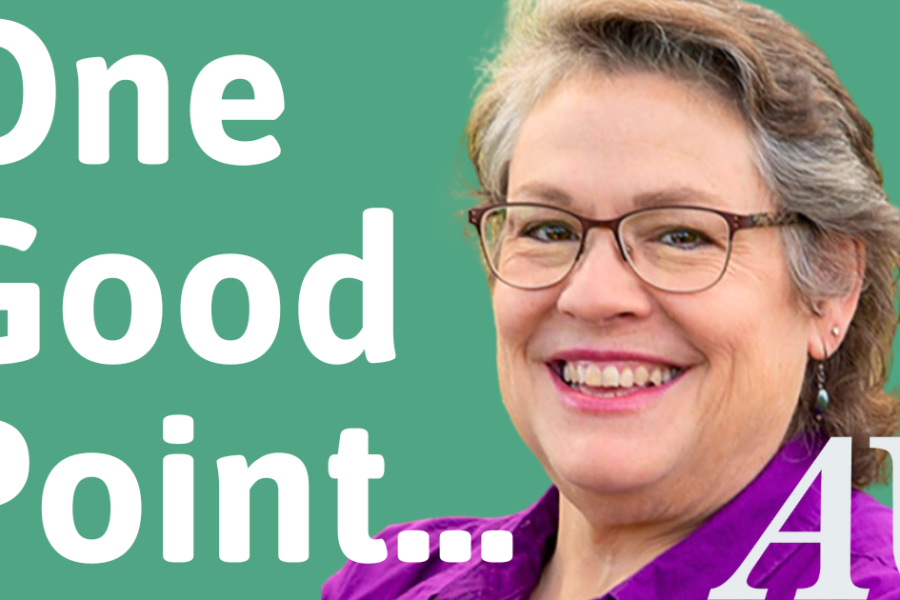Antioch University’s PhD in Leadership and Change prepares students to lead in many fields. Recently, we caught up with six alumni who are making positive changes in higher education.
These alumni are each doing important work, from identifying and lowering barriers faced by today’s student populations to developing intentional ways to create a sense of belonging, from cultivating intercultural conversations to fostering in youth a spirit of giving back, and from leading mindfully to helping Latinx students thrive. They are building on the skills they honed in the PhD in Leadership and Change, they are using insights and processes they developed while researching and writing their dissertations—and they are making positive impacts on their institutions.
One quality each of these alumni has in common is a passion for important work that makes a difference in the lives of students, faculty, and staff. But each is also doing inspiring work that is specific to them, to their story, and to what they have to offer.
Cultivating Student Leadership

For Mea Ashley, her study of leadership applies directly to her students. She currently serves as Director of Student Life at Mississippi University for Women, where her duties include overseeing student organizations, social and Greek life, community service, and leadership programs. In this work, one of her main goals is to cultivate student leadership. Yet in the aftermath of the murder of George Floyd and the protest movement that arose in its wake, she realized she needed to weave leadership with more dedicated Diversity, Equity, and Inclusion efforts. “We had to think more critically,” she says, “about how to serve students and… how to lead students through challenging times and racial reckoning.”
In the PhD in Leadership and Change, she was able to explore these questions in a collegial environment. And she says that it was exactly this feeling that her classmates and cohort mates were colleagues and friends that made her experience outstanding. The feelings of mutual respect allowed the program to be less stressful than she had worried and more fulfilling. “People who are leaders already have high expectations for themselves,” she says. “The leaders at Antioch treat you as equals, and it takes some of the pressure off.”
This, in turn, has inspired her ongoing approach to treating the students whose social lives she has such influence over in her job. She endeavors to treat them the same way she was treated in her PhD program by being a great mentor and advisor.
And the part of her work where she oversees Greek life has also been informed by her dissertation, which ended up being titled: “‘Because God Said So’: A Thematic Analysis of Why People Denounce Black Greek-Letter Organizations.” For this research, she wanted to ask the question of why BGLOs—fraternities and sororities that serve Black students—were facing a wave of criticism claiming that they were anti-Christian. In this, as in so much, she has been able to take her doctoral study back into her work, paying it forward.
Creating a Culture of Giving Back

Félix Alonso, who was in the same cohort as Ashley, decided to come to Antioch in part because the diversity of the PhD in Leadership and Change spoke to him, offering a diversity of experience and background in his cohort that was, for him, a new experience. “The ability to be in dialogue was important,” he says, “and my cohort did so well in relationship building that I found a sense of belonging. Leadership is about relationships and being in relationship with others.”
For Alonso, who graduated in 2022, the importance of relationships has been clear throughout his career. He is currently the Director of Student Philanthropy at The Ohio State University, where he works to teach altruistic behavior and create a culture of giving back both to the university and to the communities that sustain students. This can mean financial giving but also volunteering and serving nonprofit organizations. “We also offer education for citizenship, encouraging students to be global citizens, good alumni, engaged in their communities,” he explains. “And,” he adds, “to be changemakers.”
For Alonso, part of the change he has worked to see in higher education is for there to be more diversity so that students don’t have the experience he had earlier in his studies, of often being the only man of color in a classroom. When he came to the PhD in Leadership and Change, he was still grappling with the self-doubt that he attributes to this feeling of being, in some way, the only one. But he says that program faculty treated his cohort as scholars and equals, modeling collaborative education, which allowed faculty to learn from the cohort as much as students learned from faculty. And he felt that faculty and staff wanted him to succeed and would support him at every step. Ultimately, completing the degree required completing a great deal of reading and writing, but at the same time, its program’s flexibility made it easier to balance doctoral study with being a father and a husband while also maintaining a career.
His dissertation research ended up being deeply relevant to his current position. He titled the final publication “Education for Citizenship: A Study of the Effects of Cocurricular Student Philanthropy Education on Prosocial Behavior,” and now he is putting its findings into action: restructuring his team, adding new curricular components to team training, and offering more research and presentations. He has also presented his findings with Indiana University’s Experiential Philanthropy Program.
Moving forward, he wants to keep looking into qualitative research for lived experiences, such as what makes a student feel a sense of belonging or what makes them want to continue being involved in communities. And he has some experience with this, as his relationships with students over the years have been so positive that he has attended more than 40 weddings for past students and, later this year, will be officiating another student’s wedding. “Transformational leadership is about inspiring the impossible,” he says. His aim, always, is to help students “perform at levels they never imagined and to dream big.”
Celebrating the Success of Others

Ashley Benson’s primary factor in deciding to enroll in the Antioch PhD was the program’s flexibility. As a full-time professional and parent, she was confident that the program would fit her timeline and her busy schedule. But she also chose it because the program’s priorities clearly aligned with what she wanted to study: leadership theories, principles, concepts, and the wisdom and experience to know when to use them.
Ultimately, though, much of what made the PhD in Leadership and Change a powerful and transformative one was the people she met along the way. And this is in keeping with so much else in her career.
Today, Benson serves as Dean of Student Engagement at Luther College, where her list of responsibilities is long: she oversees student activities, resident life, student emergencies, counseling, wellness, student conduct, aspects of Title IX, diversity efforts, and even some academic work. Her role, she explains, is “woven into the fabric of what it means to be a student, helping students to gain a sense of comfort and home with the intention to be successful within and outside of the classroom.” And in this position, she keeps her former classmates close, both as professional contacts, as friends, and sometimes even having the opportunity to invite members of her Antioch cohort to Luther College as guest speakers.
As a leader, she tends to focus on the positive. For her dissertation, she researched first-generation college students and how they succeed. In framing this work, she decided to reject the concept of deficit and instead looked at first-generation college students from the perspective of “Why are they graduating?” Using this positive framing, she explored cultural concepts and social structure, eventually completing the work titled “An Exploration of Factors Influencing First-Generation College Students’ Ability to Graduate College: A Delphi Study.”
Since graduating, she has been able to use this research to guide institutions she works with on how to best work with first-generation college students, how to review and update policies and procedures with a different lens, and how to do away with unnecessary barriers. She has also sat on a dissertation committee as a subject matter expert.
But the highlights of her career all come down to the relationships Benson has with students. And clearly, the effect she’s having is notable on their end, too. Students she has supported sometimes send her holiday cards, inform her of positive life changes, and even invite her to their weddings. She’s particularly proud of the accomplishments of her former students, some of whom have begun studying for their own PhDs, found acceptance into medical or law school, or even started out in newly emerging fields, like working as a Fashion Psychologist. She loves to watch her students overcome odds and adversities to graduate. And she continues to remain there to encourage her students long after their formal relationship has ended. As she says, “When they don’t have the confidence or someone else told them they can’t, I will help walk them to it.”
Belonging and Education as a Career Focus

After more than a decade-and-a-half working in nonprofits that served youth, in 2010, Angela Wellman shifted to work in higher education. Working in the Multicultural Center at The Ohio State University, she found purpose and satisfaction in creating community, facilitating intercultural programming, and building programs that help staff and students feel connected to their educational institution. Work promoting equity-mindedness and understanding at this level suited Wellman, and over the ensuing decade, she rose from Intercultural Specialist to Associate Director and then, last fall, to Director of Belonging and Education for Student Life.
This rise coincided with her progress in and graduation from the PhD in Leadership and Change. This job and her doctoral studies are connected in other ways, too. Her role at The Ohio State University is staff-focused, prioritizing learning, development, and staff engagement. Her approach to her current work has been influenced by the dissertation she wrote at the GSLC: “Exploring Supervisory Needs of First-Generation Professionals Working in Higher Education.” By completing this work, she says, she is “better equipped to talk about class and socioeconomic status.”
When it comes to honing in on what staff need from their supervisors to promote their well-being and success, “we have a value system focused on increasing access and reducing the number of barriers impacting staff in their work with students,” says Wellman. At Antioch, she developed greater awareness and knowledge of social justice and equity, perspective-taking, and leadership. This translates into her current work addressing the ways staff experience belonging, creating space for growth and engagement on campus, and affirming all of her community.
Cultivating Mindful Leadership

For James Van Auken, a 2019 graduate of the PhD, his work and personal interest have both led him to focus on the intersection of mindfulness and leadership. For seven years, he served as the Vice President of Academic Affairs and, more recently, as President of Atlantic University in Virginia. In fact, he even coordinated the team of faculty there who together created the curriculum of what would become Atlantic University’s Mindful Leadership graduate program. And today, he is working for his own business, which focuses on Executive Leadership Coaching. In each step of his career, Van Auken has brought a grounding in and passion for mindful leadership.
This deep interest in a subject that not everyone took seriously at the time is part of what led him to Antioch. As he looked for an education program that would equip him with leadership theory and practice, he also knew that he wanted to be part of a community of learners that would be supportive of him and, in turn, where he could support others. He found that at Antioch.
A mindfulness practitioner before his career in higher education, Van Auken credits his practice as giving him what he describes as “awareness that helped me integrate the many separate parts of myself.” The desire to study mindfulness in the context of leadership studies led him to focus his dissertation on leaders who practice mindfulness. He asked questions about what it means to bring presence into leadership, and this, in turn, he says, “intersects with leadership theories such as authentic leadership theory, adaptive leadership theory, and many others.” A big question in leadership studies is, What happens when we encounter challenges? Mindfulness, Van Auken found, offers space for presence without leading to an immediate reaction and not needing to retaliate. In his final dissertation, “The Relationship Between Mindfulness and Leadership: How Mindfulness Practices Affect Leadership Practices,” he found that mindful leaders carry personal resilience and recovery from the internal landscape to the group and, ultimately, to the leadership function.
In addition to leadership theory and practice, the experience of studying for his PhD also gave Van Auken important lessons about how to understand his unearned privilege. “The learning community was generous, supportive, safe, and deep,” he says. While some might assume that a program and university emphasizing racial justice would judge white students more harshly, Van Auken experienced the opposite. He says that “even as a white man,” he felt “supported in raising a hand and admitting he didn’t truly understand unearned privilege.” He was able to see perspectives from different angles he otherwise may not have had the opportunity to consider.
Today, Van Auken is a leadership development coach, helping individuals to grow and develop their leadership skills and find their authentic sense of self as a leader. His collective work enables more people to encounter these ideas and resources, ultimately helping many to be more mindful leaders.
Dedication to Latinx Success

Another recent graduate, Sarah Villareal, also came to the PhD in Leadership and Change because of a need for a flexible program that fits with a preexisting career in higher education. For Villareal, who graduated earlier this year, the caliber of faculty stood out to her and offered her beneficial exposure to expertise, tools, and practices to lead students to success. “My program transformed my identity into a scholar-practitioner,” she says. “I’m grateful for the exposure to literature and theoretical frameworks and the ability to engage in those conversations as a peer.”
Today she serves as Chief of Staff in the Office of the President of California State University San Marcos. Cal State San Marcos is a Hispanic serving institution with a large Latinx population, and Villareal is committed to making systemic changes and providing more opportunities to students. She feels she can do more for incoming students to have a sense of belonging with faculty and peers. This is why, for her dissertation research, she chose to focus on the ways that the U.S. higher education system fails Latinx undergraduates, as she puts it, “more often than other students.” The final dissertation, titled “A Narrative Inquiry of Latinx Undergraduates’ Participation in High-Impact Educational Practices,” examines this problem with a focus on identifying evidence-based practices that can help reduce these inequities.
The work of researching and writing the dissertation has helped her put these factors into practice in her current roles. As she explains, “The impact of Antioch personally and professionally allows me to approach everything through a lens of critical thinking and application of research to help me do this work.”
Ultimately, the work of studying in the community over the years, of deeply researching with guidance from faculty mentors, and of completing and publishing her dissertation has been a transformative experience for Villareal—as it was for the other alumni we spoke with. As changemakers, each is taking their passion and accumulated skills to impact the field of higher education. They are focusing on belonging, inclusion, cultivating community and mindfulness, celebrating success, and giving back. And it’s clear that these works are building hopeful progress in the field of higher education—seeds sown today that will be transformative over the coming decades.



